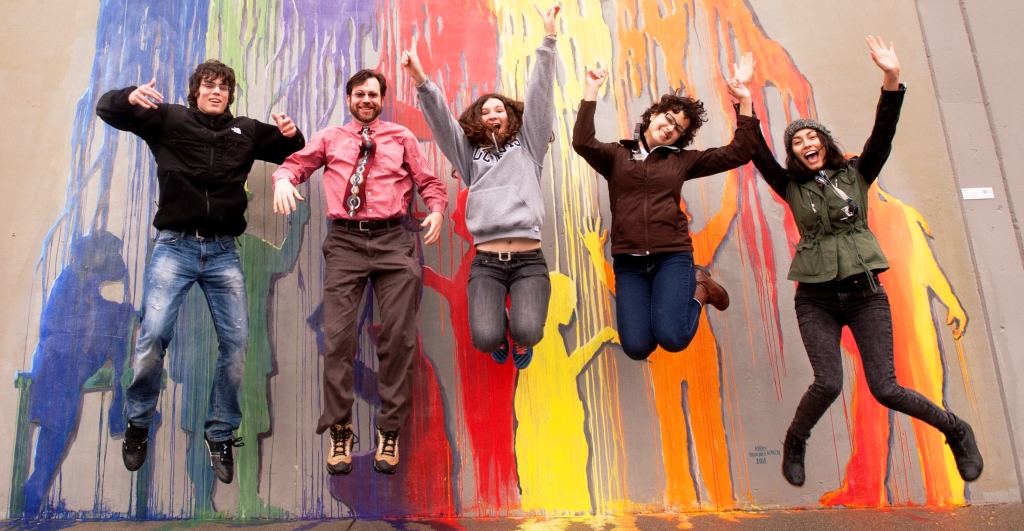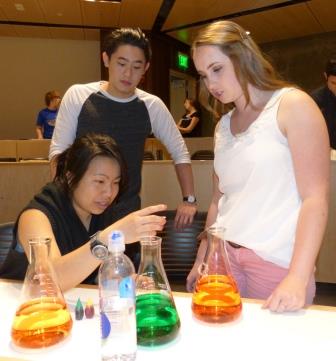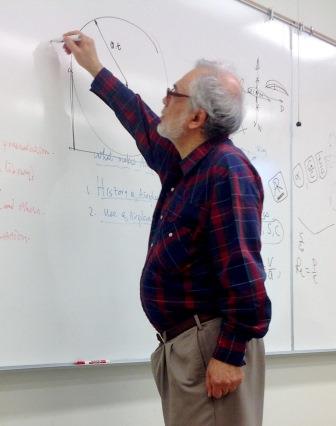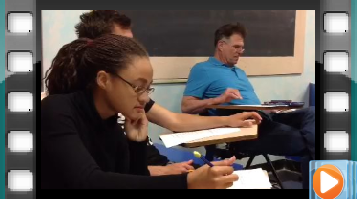Dr. Andy Jones’s students are on a quest to find and photograph the public art and cultural icons they've been studying all quarter. Where is that Billie Holiday mural? The bench shaped like a dog? The circus pillar? The hunt wraps up Jones's first-year seminar on the cultural life of Davis, which introduced students to leaders of Davis's burgeoning arts and culture scene, including John Natsoulas, owner of Natsoulas Gallery and the driving force behind the Trans-Media Art Walk and the Davis Jazz and Beat Festival; Sinisa Novakovic, owner of the Varsity Theater indie cinema, Mishka’s Cafe, and Icekrimski, a trio of businesses which brings European style to Second Street; and Don Saylor, Yolo County supervisor and former Davis mayor. Students Annie Ashmore and Hanni Newland took the seminar to bridge the gap between being students and being a part of the broader Davis community. "We were surprised at the amount of public art and art lovers in the Davis community," they said. "Spending time downtown every Friday encouraged us to explore our city and its culture rather than focusing solely on what the UC Davis campus has to offer."
The course is a popular offering in the First-Year Seminars program, which offers students new to UC Davis – both freshmen and transfer – the opportunity to study special-interest topics in a small-classroom setting. Designed to encourage students to engage in discussion with faculty and fellow students, the seminars are limited to nineteen participants; the often unusual topics stimulate inquiry and expose students to different approaches to research. About 200 seminars are offered each year, with topics ranging from the Big Bang to meditation. “These courses appeal to the adventurer in all of us. Faculty teach subjects about which they are passionate, and students not only learn new things, but get to teach them to their fellow explorers,” says Chris Thaiss, director of the Center for Excellence in Teaching and Learning, which coordinates the seminars.

In the Sensory Theater at the Robert Mondavi Institute for Wine and Food Science, Viticulture and Enology professor Susan Ebeler leads a seminar on Stinky Cheese and Roasted Coffee: Understanding What Makes Food Taste the Way it Does. The class buzzes with activity as groups of students prepare projects which study flavor perception: one group offers blind tastings of name-brand and store brand colas, testing whether familiarity with a product influences the ability to distinguish it from similar products. Another investigates whether taste perception of pudding is affected by the color of the plate it’s served on; a third group has students testing how peppermint can make a sweet juice taste bitter. A fourth explores how color affects perception of foods and beverages by having subjects taste a mystery liquid treated with various neon-bright colors. Students confidently explain their projects using research principles and a flavor vocabulary which Ebeler developed for the class. Glass bottles containing flavored liquids labeled bitter, sweet, acidic and umami anchor the words to specific taste experiences; students can also sniff coffee, vanilla, butterscotch and other flavors. Food science major Alyssa Steger enjoys the class because it’s an early opportunity to gain experience in her field a small classroom setting. Her friend and lab partner Pasha Smedlund, who is undeclared, enthuses, “I took the class because she said I had to, it was so much fun!”

Using a balsa-wood airplane, Mohamed Hafez deftly demonstrates principles of lift and drag; center of gravity and angle of attack; stability and equilibrium. What happens if you remove the tail system? The wings? The metal piece on the nose? Hafez, a professor of Mechanical and Aerospace Engineering, teaches a trio of seminars each year How Airplanes Fly, Rocket Science, and How Satellites Work – which offer a taste of engineering with only high school mathematics and physics as prerequisites. The lively lecturer turns the class over to a student group for a presentation. Each student participates on a team that will present to the class, whether on the history of flight or its future, as a way to learn teamwork and how to do research. “The purpose of First-Year Seminars is to learn how to learn,” says Hafez. The seminars encourage students “to turn their curiosity into the exploration of a new field.” And indeed, with half the class engineering students, among the the most vocal are Larissa Schumacher, an undeclared student exploring her interests, and her classmate, a biological sciences student who says, "I've just always loved airplanes."

“My class starts with a question: is there something signature about certain people that leads them to choose a percussive instrument rather than a melodic one? It's about learning different methods of inquiry,” says Brad Henderson. “At the university level, you don't just collect knowledge. You ask questions and you synthesize knowledge into answers.” Henderson’s seminar surveys various psychological approaches, moves into analysis of drumming style, and finally, students focus on a specific musician, using psychobiography and analysis of drumming style to look for connections.
Henderson and his students developed a critical listening rubric to identify and characterize elements of drumming in a song, and make judgments about how one drummer's style varies from another based on how they apply those components. “It's a great lesson in evaluation - if you want to evaluate something in a meaningful way, you have to establish a set of meaningful criteria - it's not a whimsical, personal judgment activity. Creating an assessment instrument is a fundamental piece of critical thinking,” says Henderson.
A number of students who take the class are drummers themselves. Julius Pasion, who took the class in 2013 said, “I’m trying to find myself in college… Taking this class made me realize why I like the drums. It’s building on self-identity – learning who you are and what makes you tick. … It makes me want to listen to a lot more music, and it’s definitely making me want to take another seminar just to pursue my interests.” Ryan Donnohoe learned about technique – “I like how we get to listen to music and talk about it on a new level. I never really picked apart drumming, and I didn’t know about 5/4 time, counting to 4, beats of 4, beats of 3.” Truman Williams appreciated the exchange of ideas. “You get a wealth of opinions. I get to hear every student in the class say what they think about a drummer. It’s not like in lecture where you just hear the professor’s opinion, and that’s it. I like how this class blended two different fields. You couldn’t really get that in a bigger class. First year seminars are the only place where you can get that, and I think it’s really worthwhile.”
So, is there a quality which leads certain people to choose drums? “We've never really arrived at a definitive answer,” says Henderson, “but the purpose of this class is the journey, and I think that's what makes the research university a very different experience.”
-Sharon Knox
More information on First-Year Seminars can be found at
http://cetl.ucdavis.edu/courses-and-events/first-year-seminars/index.html

